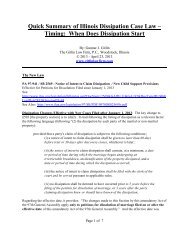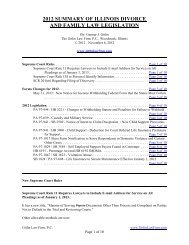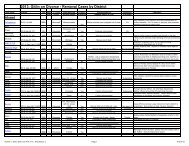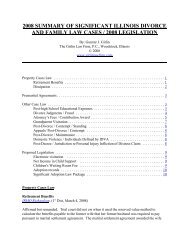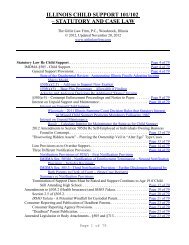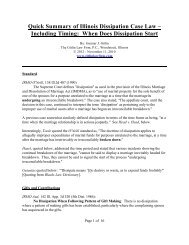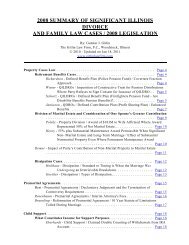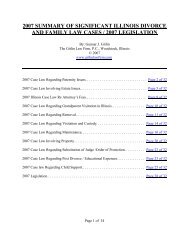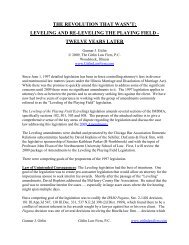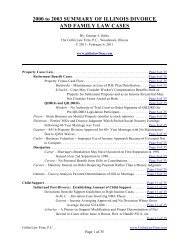child support 101/102 - The Gitlin Law Firm
child support 101/102 - The Gitlin Law Firm
child support 101/102 - The Gitlin Law Firm
Create successful ePaper yourself
Turn your PDF publications into a flip-book with our unique Google optimized e-Paper software.
Student Loans May be Only Partially Deductible: A 2004 case addressing the so called business<br />
expense deduction is Roper v. Johns, 281 Ill.Dec. 655, 804 N.E.2d 620 (Fifth Dist. 2004), GDR<br />
04-37, in which the Fifth District appellate court found student loans (in this case for law school)<br />
may only be partially deductible based upon the rationale of the IRMO Heil, 233 Ill. App. 3d 888,<br />
892, 599 N.E.2d 168, 171 (1992) case (hunting lodge expenses only 50% deductible).<br />
<strong>The</strong> Roper court first commented:<br />
<strong>The</strong> only such deduction relevant here is the deduction for the repayment of loans for<br />
"reasonable and necessary expenses for the production of income." 750 ILCS<br />
5/505(a)(3)(h). This court has recognized that student loans fall within this category.<br />
IRMO Davis, 287 Ill. App. 3d at 854, 679 N.E.2d at 116. Although we held that the<br />
loans at issue in In re Marriage of Davis were deductible in their entirety (see IRMO<br />
Davis, 287 Ill. App. 3d at 856, 679 N.E.2d at 117), our opinion should not be read<br />
as holding that student loan payments will always be completely deductible. Like<br />
other debt payments deductible under this provision, student loans must be both<br />
reasonable and necessary for the production of income. See IRMO Davis , 287 Ill.<br />
App. 3d at 853, 679 N.E.2d at 115 ("simply because an expense falls into the<br />
category of a debt repayment does not mean that it is necessarily deductible")."<br />
Regarding whether a deduction is an all or nothing proposition, the Roper court stated: "Moreover,<br />
our examination of the purposes to be served by allowing the deduction in the context of student loan<br />
payments convinces us that trial courts must have the flexibility to find that a partial deduction is<br />
warranted."<br />
After reviewing the law in other jurisdictions as to the issue, the appellate court stated:<br />
“With these principles in mind, we next consider whether-and to what extent-the debt<br />
Jeff incurred in pursuing his education was reasonable and necessary. Illinois courts<br />
have defined "necessary" expenses as " 'those expenses outlaid by a parent with a<br />
good-faith belief his or her income would increase as a result, and which actually did<br />
act to increase income[] or would have done so absent some extenuating<br />
circumstances.' " IRMO Davis, 287 Ill. App. 3d at 853, 679 N.E.2d at 115 (quoting<br />
Gay v. Dunlap, 279 Ill. App. 3d 140, 149, 664 N.E.2d 88, 95 (1996)). We have<br />
defined "reasonable" as not immoderate, extreme, or excessive considering the<br />
relationship between the amount of the expenditure and the amount by which the<br />
parent's income is expected to increase as a result. IRMO Davis, 287 Ill. App. 3d at<br />
853, 679 N.E.2d at 115 (citing Gay, 279 Ill. App. 3d at 149, 664 N.E.2d at 95)." As<br />
to the amount of the partial deduction the appellate court finally reasoned, "In the<br />
instant case, Jeff's combination of degrees enhanced his earning capacity and was,<br />
therefore, necessary for the production of income. However, we do not believe that<br />
the expenditure was reasonable-at least not in its entirety-for two reasons. First, it<br />
was entirely possible for Jeff to attain those degrees without incurring such an<br />
overwhelming level of debt. He could have found a job using the skills he had<br />
acquired with his undergraduate business degree and either attended law school part<br />
time while working full time or waited a few years between college and law school<br />
so he could pay down some of his undergraduate loans and save money towards his<br />
law school tuition and expenses. Further, he could have applied to law schools with<br />
lower tuition. Second, we agree with the trial court that the amount of debt incurred<br />
was excessive in relation to the extent to which Jeff's income was enhanced."<br />
<strong>Gitlin</strong> <strong>Law</strong> <strong>Firm</strong>, P.C. 1-34 www.gitlinlawfirm.com




